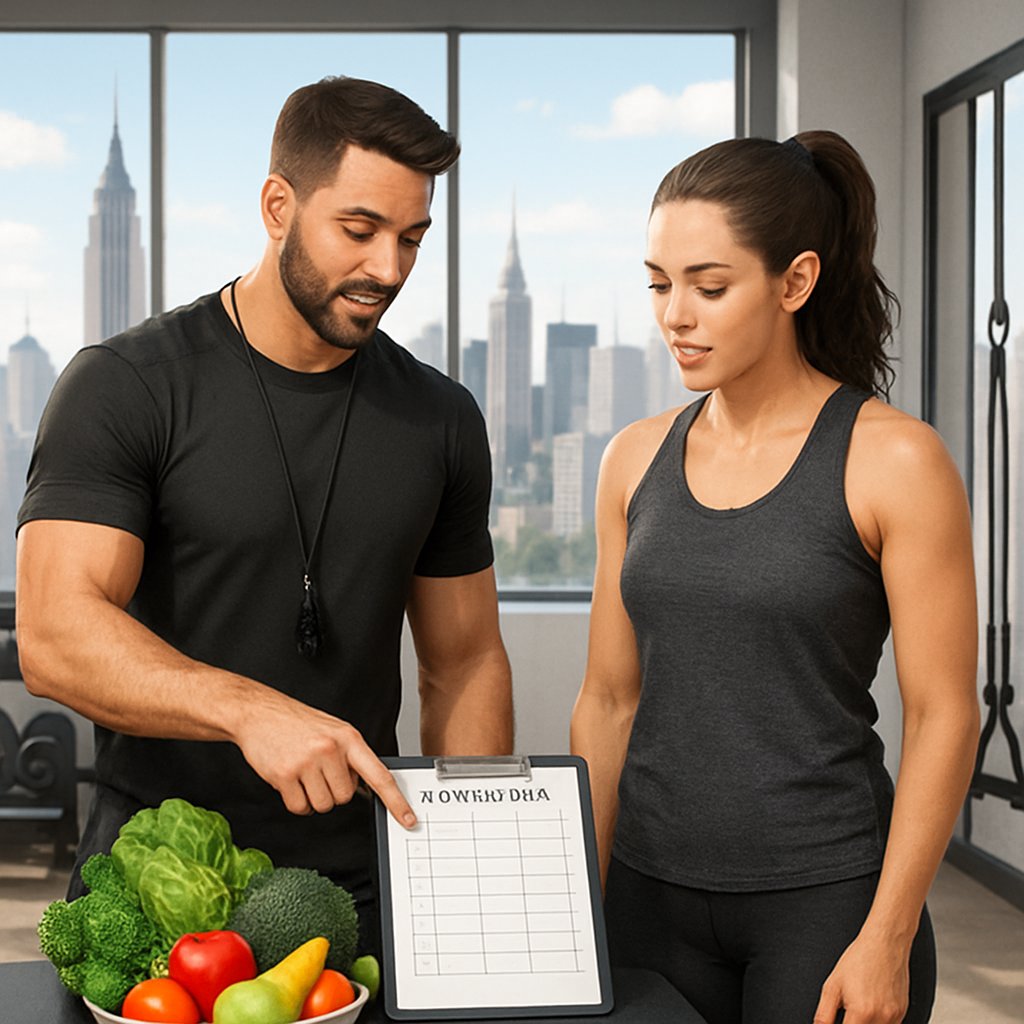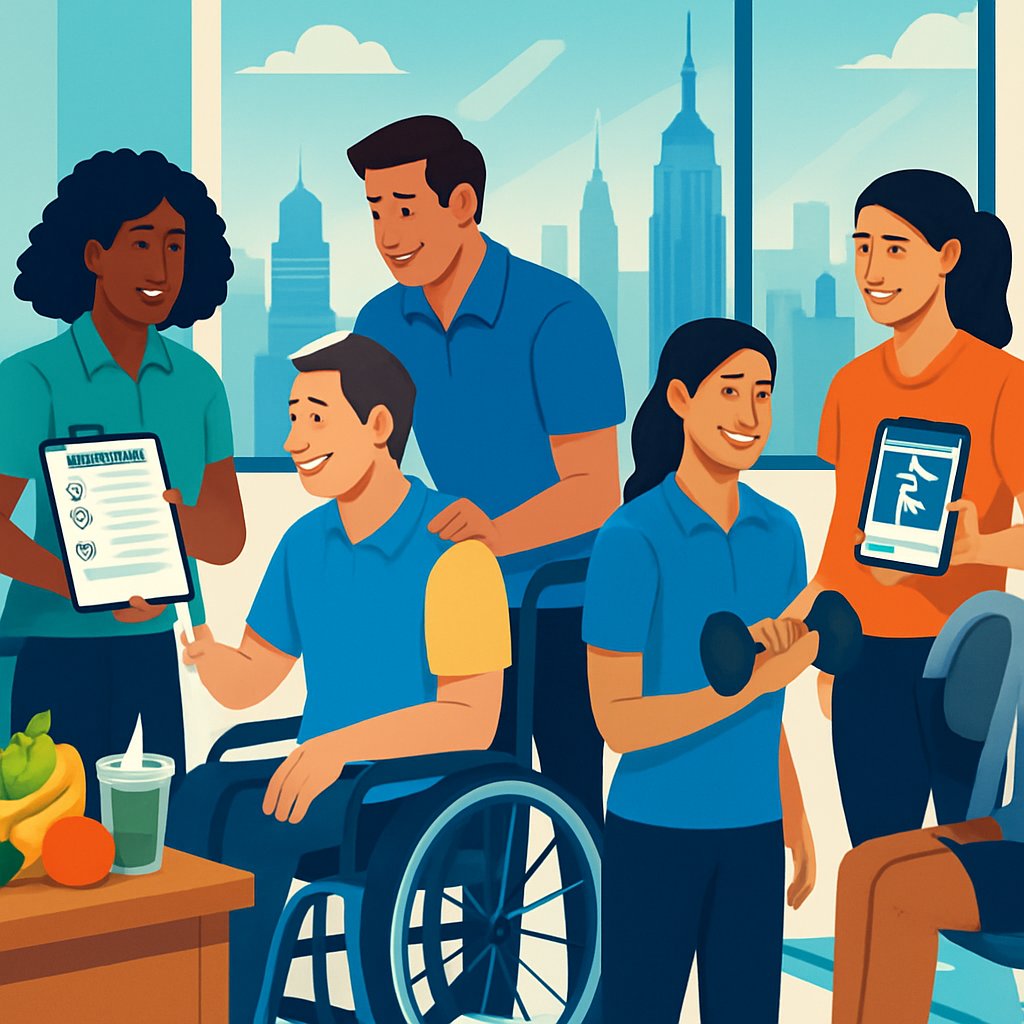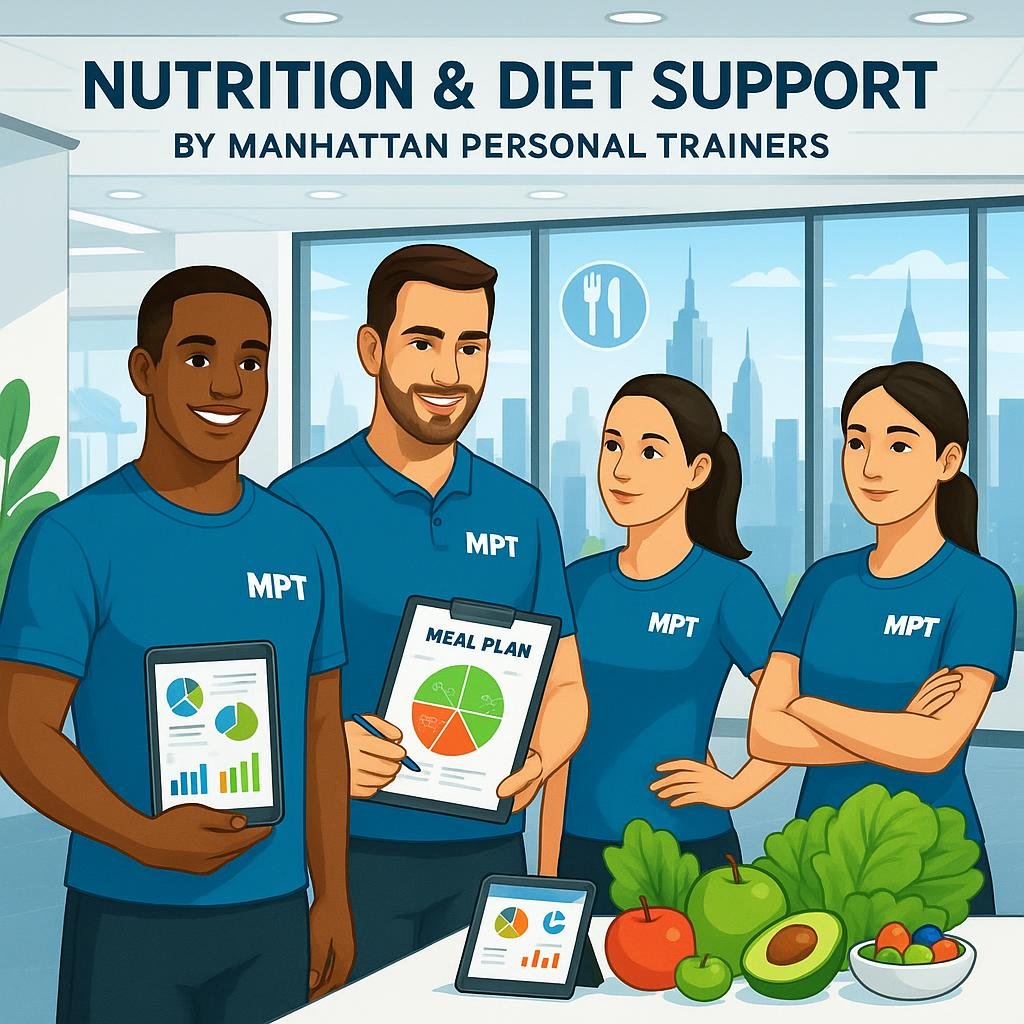Finding solid nutrition support in Manhattan can be the game-changer between hitting your fitness goals and just spinning your wheels. A lot of personal trainers in NYC now offer full-on diet and nutrition services alongside their training sessions.
Nutrition and Diet Support is crucial for achieving lasting fitness goals.
That combo gives you a real shot at tackling both sides of the fitness puzzle—what you do in the gym and what you eat outside of it.
A comprehensive approach to Nutrition and Diet Support optimizes results.

Personal trainers all over Manhattan, from the Upper East Side to Midtown and the West Village, are stepping up with personalized nutrition coaching and meal planning. This means you get support for both workouts and daily meals.
With effective Nutrition and Diet Support, you can transform your health.
If you’re working with a certified personal trainer and nutritionist or using nutrition coaching services, these programs are designed to help you stick with it and see results. It’s just easier when one pro handles your workouts and your food—it saves time and keeps things consistent.
Nutrition and Diet Support provided by trainers ensures a holistic approach.
Key Takeaways
- Manhattan personal trainers are offering both fitness and nutrition services for a complete wellness package.
- These programs sync your workouts with meal planning and nutrition advice.
- You can find flexible, in-person, and virtual nutrition coaching options all over NYC.
Nutrition and Diet Support: Core Services by Manhattan Personal Trainers
By integrating Nutrition and Diet Support into your fitness regimen, you can achieve better results and maintain a healthier lifestyle.
Successful fitness training incorporates Nutrition and Diet Support seamlessly.
Manhattan personal trainers don’t just hand you a workout—most will help you with nutrition, too. They’ll work with you on custom meal plans, weight loss coaching, and practical diet strategies that actually fit your life.
Nutrition and Diet Support is personalized to fit your lifestyle and preferences.
Personalized Meal Planning
Nutrition and Diet Support is essential for anyone seeking a balanced diet.
Your trainer will build a meal plan based on your body type, goals, and daily grind. They’ll ask about your favorite foods, allergies, and how comfortable you are in the kitchen.
Personal trainers in Manhattan usually start by looking at your current eating habits through food journals or a quick chat. That way, they can spot what needs tweaking and help you find meal times that won’t mess with your work schedule.
Personalized meal planning might include:
- Calculating calories and macros
- Grocery lists and meal prep tips
- Restaurant suggestions in your area
- Adjustments as you go
A lot of trainers use digital tools or apps to help you track meals and stick to your goals, which is honestly a lifesaver on those chaotic Manhattan days.
Nutritional Coaching for Weight Loss
Weight loss coaching is about more than just cutting calories. Your trainer will teach you about portion sizes, how to spot real hunger, and ways to avoid emotional eating.
Understanding Nutrition and Diet Support can enhance your weight loss journey.
Nutritional guidance services focus on creating a calorie deficit that’s doable, not miserable. You’ll lose weight but still have energy for workouts and everything else.
With proper Nutrition and Diet Support, achieving a calorie deficit is achievable.
Your trainer checks in regularly to see how you’re doing. They’ll tweak your meal plan as your body and metabolism change.
Weight loss coaching often covers:
- Weekly weigh-ins and body measurements
- Logging your food and tracking habits
- Tips for eating out in Manhattan
- Help getting past plateaus
The process tackles both the physical and mental sides of weight loss. It’s not just about the scale—it’s about making changes that last.
Pre- and Post-Exercise Nutrition Strategies
Eating right around your workouts can make a big difference in how you feel and recover. Trainers offer specific advice for what to eat before and after you exercise.
Nutrition and Diet Support strategies improve workout recovery significantly.
Before workouts, you want food that fuels your muscles but won’t upset your stomach. Trainers usually suggest carbs and a bit of protein, eaten 1-3 hours ahead, plus plenty of water.
Pre-workout tips:
- Eat 1-3 hours before training
- Focus on easy-to-digest carbs
- Add a little protein
- Hydrate well
After a tough workout, you need protein to repair muscles and carbs to refuel. Manhattan personal trainers can recommend quick, portable meals that fit your commute or workday.
Nutrition and Diet Support helps build an effective post-workout routine.
Science-Backed Dietary Recommendations
Most Manhattan trainers base their nutrition advice on real science, not fads. They keep up with the latest research so you’re not left guessing.
Relying on Nutrition and Diet Support keeps you informed about dietary options.
Registered dietitians and nutrition experts often collaborate with trainers to make sure you’re getting safe, legit advice.
Your trainer will explain why they’re recommending certain foods or habits. That way, you’ll know how to make good choices even when you’re off-plan.
Evidence-based advice usually covers:
- Getting enough protein
- Balancing your macros
- Making sure you get essential vitamins and minerals
- Hydrating based on your activity
They’ll steer you clear of extreme diets. The goal is to find a way of eating you can actually stick with, even with Manhattan’s hectic pace.
Integrating Nutrition with Manhattan Fitness Training
Integrating Nutrition and Diet Support leads to improved training outcomes.

Manhattan trainers know that nutrition and exercise work best together. They’ll help you fine-tune your eating for strength, endurance, or whatever your main goal is.
Nutrition and Diet Support is a key factor in achieving fitness goals.
Synergy of Nutrition and Strength Training
Your strength training results hinge a lot on what you eat and when. Personal trainers in Manhattan help you dial in protein and carbs around your workouts.
Before you lift, you’ll want some quick carbs 30-60 minutes ahead for energy. Afterward, protein within 30 minutes is key for muscle repair.
Strength training nutrition basics:
- Protein: 0.8-1.2g per pound of body weight each day
- Carbs: 2-3g per pound on training days
- Timing: Protein right after your workout
Manhattan trainers often suggest whole foods like Greek yogurt, lean meats, or quinoa. These keep you fueled for tough sessions.
And don’t forget water—hydration is huge for strength and recovery.
Endurance Nutrition for NYC Races
If you’re training for something like the New York City Marathon, nutrition gets even more specific. Manhattan trainers know the drill for fueling before, during, and after those long runs.
Carb-loading is a thing 3-4 days before race day. Aim for 8-10g of carbs per kilogram of body weight to top off your energy stores.
During long runs in Central Park, you’ll need 30-60g of carbs per hour after the first hour. Think sports drinks, gels, or bananas.
Marathon fueling timeline:
- 3-4 days out: Boost your carb intake
- Race morning: Light breakfast 3-4 hours before
- During the race: 30-60g carbs every hour after mile 6
Endurance-focused trainers help you test these strategies in training so nothing surprises you on race day.
After long runs, get some carbs and protein within 30 minutes. Your body will thank you at your next session.
Nutrition Support in Personal Training for Seniors
Personal training for seniors means nutrition plans get a little more tailored. As you age, your body’s needs shift, so having a pro in your corner helps.
Older adults actually need more protein to keep muscle. Manhattan trainers working with seniors usually recommend 1.2-1.6g per kilogram of body weight daily.
Incorporating Nutrition and Diet Support is vital for senior health and wellness.
Calcium and vitamin D matter, especially if you’re doing strength work. These nutrients keep your bones strong.
Senior-specific nutrition:
- More protein for muscle
- Watch hydration since thirst cues fade
- Focus on whole, nutrient-dense foods
Midtown trainers also help seniors manage medication and diet interactions. Some meds mess with appetite or how you absorb nutrients.
Meal timing can make a difference, too. Smaller, more frequent meals can keep energy steady.
Anti-inflammatory foods—think salmon, leafy greens, berries—are great for recovery. Your joints and muscles will feel the difference.
Customization and Accessibility of Services in Manhattan
Accessing Nutrition and Diet Support ensures everyone’s dietary needs are met.

Manhattan trainers know everyone’s schedule is nuts. They offer nutrition support in-home, online, or tailored to your neighborhood.
Nutrition and Diet Support can be tailored to fit various lifestyles.
In-Home Personal Training and Flexible Scheduling
In-home personal training means your trainer comes to you—apartment, office, wherever. No subway rides needed, which is a win in places like Midtown.
They’ll even check out your kitchen and help you set up for healthy meal prep, even if your space is tiny.
Flexible scheduling looks like:
- Early mornings before work
- Lunch breaks
- Evenings after business hours
- Weekend meal planning
Upper East and West Siders often go for mornings. Tribeca and SoHo folks might prefer evenings.
Your trainer works with your calendar, not the other way around. That makes it way easier to stick with it.
In-Person and Virtual Nutrition Support
In-person and virtual Nutrition and Diet Support options are available.
You can pick in-person or online sessions, whatever fits your life. Virtual nutrition counseling is just as personalized as face-to-face.
In-person works great for grocery shopping or kitchen setup. Trainers might even hit up local markets with you.
Virtual sessions are super convenient, especially if you’re uptown or just want to avoid traffic. You just need Wi-Fi.
Virtual options include:
- Video calls for meal planning
- Reviewing food logs online
- Cooking demos over Zoom
- Quick check-ins by text
Some trainers mix both. Maybe you meet in person once a month, then check in online every week.
Tailoring Diet Support for Diverse Manhattan Neighborhoods
Every Manhattan neighborhood has its own food scene and lifestyle quirks. Trainers tweak plans to fit your area and culture.
Harlem and Morningside Heights clients often use local farmers markets. Trainers work those fresh finds into your meals.
Utilizing local resources enhances Nutrition and Diet Support effectiveness.
In Little Italy or the Lower East Side, you’ve got tons of ethnic options. Trainers help you make smart picks from Italian, Jewish, and other cuisines.
Neighborhood-specific tips:
- Central Park: Ideas for outdoor meals and picnics
- East Village: Late-night healthy eats
- Financial District: Fast breakfast and lunch options
- SoHo: Trendy health food spots
Your trainer gets what’s available and affordable where you live. They’ll build realistic meal plans that actually work in your neighborhood.
Cultural food traditions matter, too. Trainers will help you eat healthy while respecting your background.
Ongoing Support and Lifestyle Integration
Ongoing Nutrition and Diet Support is crucial for lasting success.

Manhattan personal trainers don’t just hand you a plan and disappear. They keep checking in, helping you tweak things and learn habits that actually stick—even when life gets busy.
Nutrition and Diet Support helps maintain focus on long-term goals.
Consistent Nutritional Check-Ins
Regular follow-up sessions are the backbone of solid nutrition programs with Manhattan personal trainers. Most people meet with their trainer every week or two, at least in the beginning.
Your personal trainer in NYC tracks your progress using food logs and body composition measurements. They’ll tweak your meal plans based on how your body reacts to different foods and portion sizes.
Nutrition counseling sessions in Manhattan really emphasize open communication. These check-ins are a chance to talk through meal prep headaches or the struggle of eating out in the city.
Upper East Side and Midtown NYC trainers try to make these sessions fit your schedule. They’ll meet you at your office, home, or even your local gym—whatever works best.
In each session, your nutritionist asks about your energy, sleep, and how your workouts feel. They use that info to adjust your eating plan and keep things moving in the right direction.
Education on Healthy Eating Habits
Manhattan personal trainers teach you skills so you can make better food choices on your own. They’ll show you how to read nutrition labels, spot healthy foods, and figure out what a real portion looks like.
You’ll get tips on navigating Manhattan’s endless restaurant options without losing sight of your goals. Trainers share strategies for ordering at popular NYC spots—sometimes you just want to eat out, right?
Healthy eating education often covers when to eat around your workout schedule. You’ll find out which pre- and post-workout foods are best at local markets and cafes.
Every Manhattan neighborhood has its own food scene, and trainers know it. They’ll help you find the healthiest options in your corner of the city.
Some sessions get hands-on. You might end up at a grocery store with your trainer, learning how to pick out top-notch ingredients for your meals.
Long-Term Accountability and Motivation
Manhattan personal trainers set up accountability systems to keep you on track for the long haul. This might mean regular weigh-ins, progress photos, or fitness check-ins.
Accountability in Nutrition and Diet Support fosters sustainable habit changes.
Your trainer works with you to set realistic timelines for hitting your goals. They’ll celebrate your small wins but keep you focused on building habits that last.
Ongoing support services sometimes include text check-ins between sessions. Getting a quick message when you’re tempted can make a big difference.
A lot of trainers use apps or online tools to keep tabs on your food and workouts. This way, you get instant feedback and can adjust things as needed.
Your nutritionist helps you figure out how to handle tricky situations like business dinners, travel, or social events. Honestly, these skills matter a lot if you’re trying to eat well in Manhattan’s non-stop environment.
Frequently Asked Questions

Knowledge about Nutrition and Diet Support enhances client confidence.
Manhattan personal trainers have to follow certain rules about nutrition support, and people usually have questions about qualifications and what’s actually allowed. It’s smart to know the differences so you can make good choices about fitness and nutrition in NYC.
What qualifications should I look for in a Manhattan personal trainer to ensure they provide comprehensive nutrition and diet support?
Choosing a trainer with Nutrition and Diet Support expertise is beneficial.
Look for trainers who have nutrition certifications in addition to their regular personal training credentials. Plenty of Manhattan fitness pros keep up with nutrition certifications and ongoing education so they can guide clients better.
Certifications from NASM, ACSM, or ACE mean trainers can give general nutrition advice within their legal limits. It’s not everything, but it’s a solid foundation.
Proper Nutrition and Diet Support ensures clients receive the best guidance.
Some trainers team up with registered dietitians for more in-depth support. Physical Equilibrium has registered dietitians on staff who can review your medical history and meal patterns.
How do personal trainers in Manhattan tailor diet plans to individual client needs?
Personal trainers can’t legally write specific meal plans or tell you exactly what to eat. Trainers aren’t licensed nutritionists—giving meal plans is outside their scope.
Instead, they’ll guide you with general nutrition education and lifestyle tips. Expect advice on portion sizes, meal timing, and picking foods that match your fitness goals.
Fitness programs get customized through personal consultations. Trainers consider your schedule, tastes, and current habits when giving nutrition support.
What range of nutritional services can I expect from personal trainers in the Brooklyn or Park Slope areas?
Nutrition and Diet Support can streamline your fitness journey effectively.
Personal trainers usually offer nutrition coaching, not medical nutrition therapy. They’ll teach you about macronutrients, hydration, and what to eat before a workout.
Many trainers give meal planning templates and help with grocery shopping. They’ll walk you through reading food labels and picking better options.
Some fitness studios offer nutrition coaching with your personal training sessions. This combo helps you sync your eating habits with your workouts.
Are Manhattan personal trainers permitted to prescribe dietary supplements as part of their nutrition support?
Personal trainers can’t legally prescribe or recommend specific supplements. That’s outside their allowed scope.
Only licensed healthcare providers or registered dietitians can do that. Trainers might explain supplement categories but shouldn’t tell you what to take.
Consulting with professionals enhances Nutrition and Diet Support quality.
If you want supplement advice, your trainer should refer you to a qualified nutritionist or dietitian. Most Manhattan trainers have a network of licensed nutrition pros they trust.
How do client reviews reflect the effectiveness of nutrition and diet support offered by Manhattan personal trainers?
Positive reviews often highlight the importance of Nutrition and Diet Support.
Client reviews often talk about trainers’ holistic approach to health. People look for wellness and nutritionist services that work with personal training in Manhattan.
Reviews mention better energy, smarter food choices, and habits that actually stick. Clients like trainers who teach them, not just tell them what to do.
The best feedback isn’t about quick fixes—it’s about lasting changes. People really value trainers who help them build a healthy relationship with food.
What differentiates the nutritional support provided by personal trainers compared to nutritionists or dietitians in Manhattan?
Nutrition and Diet Support differentiates trainers from other health professionals.
Personal trainers mainly focus on how nutrition impacts your workouts and overall wellness. They won’t diagnose medical issues or treat eating disorders, and honestly, that’s not their lane.
Registered dietitians go a step further. They create custom meal plans and address medical nutrition needs.
They also team up with healthcare providers. Dietitians will look at your medical history, medications, and even lab values to give you a more complete plan.
Nutritionists play a huge role in weight loss programs for busy people. Their clinical expertise really complements the hands-on fitness advice you get from trainers.

